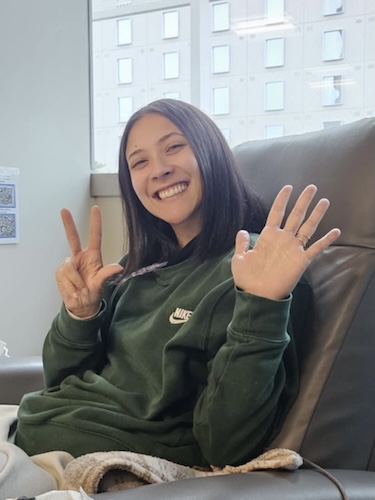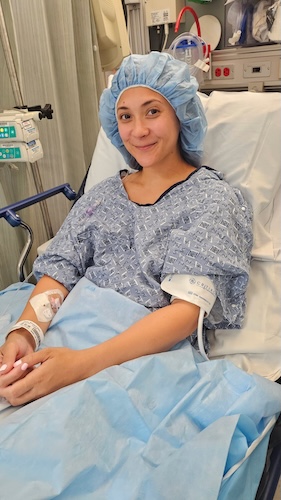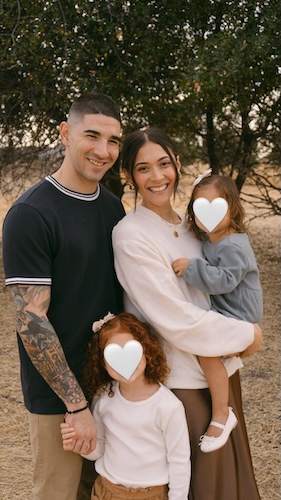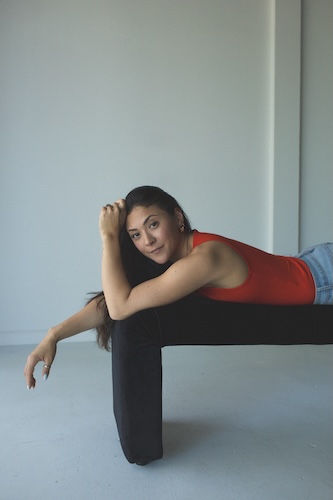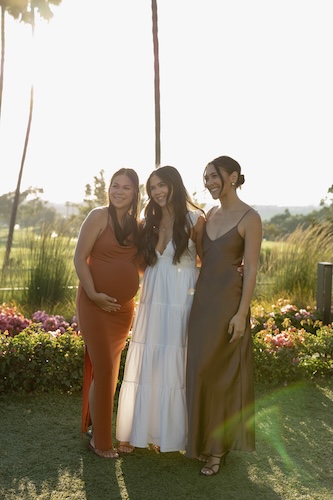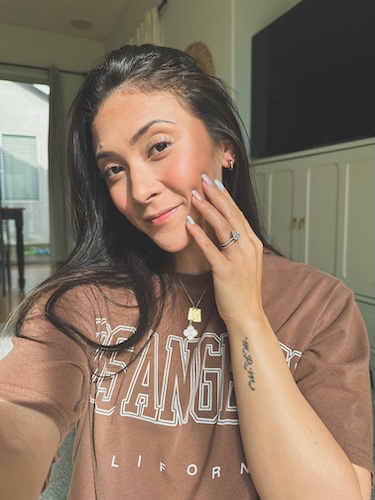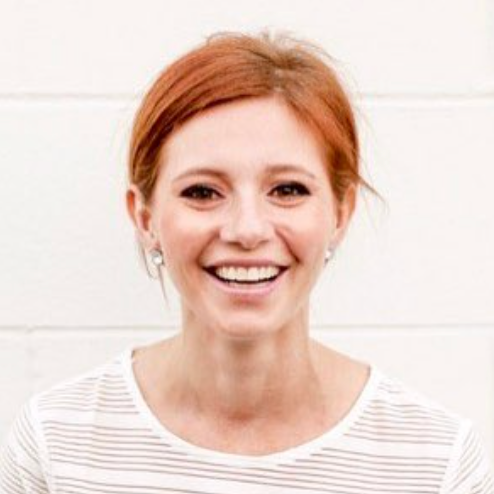Cancer is Not Just an Older Person’s Disease: Kalei’s Stage 4 Rectal Cancer Story
Kalei’s stage 4 rectal cancer story is an eye-opener for anyone who thinks that serious illness only happens later in life. At 28, a healthy young mom of two, she first noticed subtle but ominous changes in her body, such as strange bowel habits and the presence of tissue-like substances and, eventually, blood in her stool. Her instincts told her something wasn’t right. Even after an initial stage 2 rectal cancer diagnosis in 2024, she trusted her gut, stayed vocal, and kept pushing for answers.
Interviewed by: Taylor Scheib
Edited by: Chris Sanchez
In early 2025, scans revealed a small lung nodule. Despite reassurances from her first oncologist, Kalei continued to ask to have this nodule checked. Her self-advocacy ultimately confirmed that the cancer had metastasized to her lungs and led to her stage 4 rectal cancer diagnosis.
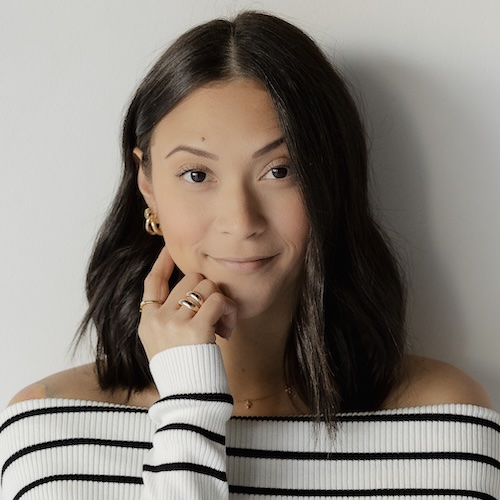
Throughout her experience, Kalei reminds us why paying attention to our bodies matters. She encourages younger people to take unusual symptoms seriously and seek proper care without hesitation. Her story highlights her personal transitions, from disbelief to determination and from fear to peace. Rather than getting lost in worst-case thoughts, she leans into faith, family, and community support. She shows that even with stage 4 rectal cancer, it’s possible to live with hope, clarity, and peace.
Kalei’s candid approach to self-advocacy is heartening and empowering. She refused to accept unhelpful answers from medical professionals and continued to press for the right ones. She emphasizes that seeking second or third opinions is not only acceptable but necessary. Her message is both urgent and clear: your life and health are worth the effort.
Kalei now focuses on making memories, nurturing positivity, and choosing doctors who listen. She believes that living fully and purposefully through planning trips, cherishing everyday routines, and capturing family photos offers strength through uncertainty. Her story is a gentle yet powerful call to stay in tune with your body, speak up for yourself, and walk through even a stage 4 diagnosis with peace.
Watch Kalei’s video and read the transcript of her interview below. You’ll learn more about:
- How she trusted her gut when doctors said it wasn’t serious
- The subtle signs that led to a diagnosis that changed everything
- How a young mom’s fight for answers inspires courage
- Learning to live fully, even with stage 4 rectal cancer
- How Kalei’s story proves that self-advocacy saves lives
- Name: Kalei M.
- Diagnosis:
- Rectal Cancer
- Staging:
- Initially – Stage 2 Grade 3
- Later – Stage 4
- Symptoms:
- Presence of mucus, tissue-like substance, and blood in stool
- Stomach cramping
- Treatment:
- Radiation therapy
- Chemotherapy
- Surgeries: two lung resections
This interview has been edited for clarity and length. This is not medical advice. Please consult with your healthcare provider to make informed treatment decisions.
The views and opinions expressed in this interview do not necessarily reflect those of The Patient Story.
- Hi, I'm Kalei
- My symptoms started in early 2024
- While waiting to get answers, I took matters into my own hands
- My care team had a plan, but it was still a shock
- The treatment worked, and I showed no evidence of disease until a suspicious spot popped up…
- After advocating for myself, I was referred to a pulmonologist, a doctor who specializes in the lungs and entire respiratory system
- My husband and I processed the devastating news with our family and friends
- At this point, I knew it was time to tell my two daughters
- I had also gotten a new oncologist, and her team knew how they wanted to handle the cancer spreading
- Even after everything I’ve been through, I’ve been able to find peace in my diagnosis
- After I had two lung surgeries, my husband and I are now focusing on moving forward with everyday life
- I want people to know: Always advocate for yourself and stay strong
Hi, I’m Kalei
I was diagnosed in April 2024 with stage 2 grade 3 rectal cancer, and then in August 2025 with stage 4 rectal cancer that metastasized to my lungs.
My symptoms started in early 2024
Before that, I was completely healthy. I never had any health issues. I had two healthy pregnancies and deliveries.
In February or March, I started experiencing weird things with my bowel habits. I was starting to go more frequently than I ever had. I usually go every few days, but then I started to go more frequently. I was like, “Oh, maybe I’m getting more fiber in my diet, eating healthier, drinking more water.” But when I would have a bowel movement, some weird tissue-like stuff would come out too. I’d never seen anything like it. It was creepy, a little alien-like. I was taking pictures, documenting, showing my husband. I was like, “Let’s just keep track of this. I’m not really sure what it is.”
After about a week or two had gone by, I was starting to have blood in my stool as well as the tissue-like stuff. I think I had blood for a few days. And at that point, my husband and I decided I needed a general physician appointment.
I made an appointment and told her all my symptoms, what I was experiencing. She looked at my history and she told me, “I’ll check and see if it’s like an internal hemorrhoid. Or, you know, after you have kids, stuff kind of tears down there.” She checked for that and said, “There’s nothing in there. I’m going to refer you for a sigmoidoscopy.”
I was waiting for that. I think it was scheduled for two months out from the appointment I had with her. She also ran blood work on me. She said, “You’re not anemic. Nothing is alarming with your blood work. Everything looks good.” I left and just waited it out.
A couple of weeks went by, and I was still experiencing the bleeding and this tissue-like stuff. I started having blood clots coming out, too. One of the ones I passed at the beginning was very big. I started having intense stomach cramping, too. I had my husband take me to the ER because if I’m bleeding this much and having clots, I can’t really wait for my appointment for this procedure.
So we went in and I told the doctor in the ER everything that had been going on, and showed him photos of my blood clots. But all he did was run bloodwork. He didn’t order scans or anything like that. And he pretty much told me the same thing that my doctor had told me a couple of weeks ago. “Your blood work looks fine. You’re not anemic. There’s nothing life-threatening. You just have to wait for that procedure.”
While waiting to get answers, I took matters into my own hands
After that ER visit, I got frustrated because my husband and I knew that what I was experiencing was serious, but I just kept getting the same answers. So I called my mom and my aunt who has experienced cancer a few times. They said, “You need to call a GI doctor, see if they have a cancellation list to get you on.” I literally got on the phone with them when I walked out of the ER, and the girl I spoke with said, “I am so happy that you called because that is not normal. And that absolutely needs to be checked out right away. I want you to go forward with a full colonoscopy instead of a sigmoid. I’ll book it, and I can bring you in next week.”
I remember my husband and I thought I had ulcerative colitis or Crohn’s disease or some autoimmune disease. And we were really hopeful. He had to work the day of my appointment. I had my mom come with me just because we weren’t super worried that it was going to be anything crazy. We were just excited to get an answer. And after I came out of the procedure, I was lying in the recovery area, and the doctor came over and he said, “I want to talk to both of you. I found a mass that is growing through the rectal wall down at the end of your colon. With the way it’s growing, I’m very concerned that it might be cancer.” That was really shocking.
We went home, and my husband and I processed it. What would we do if it were cancer? I remember this is just so significant to my personal story.
The day after my colonoscopy, I was driving somewhere by myself, and I was listening to my worship music, and a little sermon excerpt had come on in between the songs that I had never heard before. It talked about sacrifice and being joyful in your suffering. It just really resonated with me. I just prayed, because when you hear “cancer,” you’re going to be in the worst-case scenario, you’re like, “What in the world is happening?” Especially for someone so young. You don’t think that could ever happen to you.
Maybe 24 hours after the colonoscopy, the doctor called and he said, “I’m so sorry, it’s confirmed that it is cancer.” So we experienced all the emotions. You can’t really predict how you would feel.
My care team had a plan, but it was still a shock
My first appointment after I got the diagnosis was with a colorectal surgeon. I had done the PET scans, the MRI, all that kind of stuff. And he brought us in and told us that he could actually do a sigmoidoscopy in the office because of the location of my tumor. And so he checked it out and said, “We’re going to take it to the tumor board, and we’re going to consult different doctors.”
He called me a couple of days later and said, “We’ve come to the decision. So you have a stage two grade three tumor. We want to start you on radiation therapy with chemo pills. And then after that, you’ll get a tiny break, and then we’re going to start you on a few months of IV chemo.
Hearing that treatment plan was a shock. We thought I was just going to get surgery and that would be it. But they said that so many studies have shown that when they treat a localized cancer first, a lot of times, they’re able to shrink it down to a tiny size or dissolve it altogether.
In my case, they were able to dissolve it. So I didn’t have surgery.
The treatment worked, and I showed no evidence of disease until a suspicious spot popped up…
It was really incredible. We were just so happy. And then they set me on a wait-and-watch plan. Every three months for that first year after I ended treatment, they were going to do a set of scans, bloodwork, and exams. I had my first round of that, I believe, in March this year.
I just went in for my regular scans and everything, and my chest CT showed that a 7mm nodule had popped up. I had never had that on any of my other scans. I immediately asked my oncologist, “What’s the deal with this thing? This is brand new. We’ve never seen this before.” And she told me it’s nothing to be worried about. Everybody has nodules on their lungs, all over their body. It’s a common thing.
My blood levels had gone down into the normal range at the end of 2024. But when I had this checkup scan in all my bloodwork, they had elevated a little bit. And then this nodule had popped up. I asked my doctor if the combination of both of those things was a concern. She said, “No, it’s still in the normal range. There’s nothing to be concerned about.”
I asked her if I could get another scan of my chest in a month, because I didn’t feel good about waiting till the next three-month cycle. After all, this thing could double in size. She told me, “No, we’re going to wait, because I can’t order that. The hospital won’t let me. They won’t sign off on monthly scans.” At that point, I was feeling really frustrated because I knew something was wrong. I’ve been through all this stuff. I can read between the lines with blood results and scan results and so on. I called my hospital and requested a second opinion. For some reason, they circled me back around her. She ended up getting me a scan four weeks out. I ran my blood test results again. When that scan came up, they had increased again, and then the nodule had grown another two millimeters.
If I hadn’t requested this, it would have just kept going and going and going. I didn’t understand why she wouldn’t want to be more proactive about something proactive about it.
After advocating for myself, I was referred to a pulmonologist, a doctor who specializes in the lungs and entire respiratory system
She’s wonderful. She let me ask a million questions. I love to ask questions, and so does my husband. She was fantastic.
She said, “I’m definitely concerned about cancer.” My CT results showed that the nodule had grown again, to 11mm. And that was in like three weeks, I think. So it was just growing, and so we were prepared that it was cancer.
She said, “Unfortunately, it is cancer. It has the same cell structure as your colon cancer, so it’s GI in origin.
I said, “Is this a stage 4 diagnosis?” And she said, “Unfortunately, it is.” That rocked my world.
My husband and I processed the devastating news with our family and friends
I remember the day I got the call for the diagnosis. It was super emotional. My husband and I couldn’t keep it together. Our family was coming over, our friends were calling, and it was just really emotional.
It felt super, super heavy. Stage 4 just sounds like, “Oh my gosh, you’re gonna die.” That’s what I feel like. We’ve all been made to think that that’s what happens when you have stage 4 cancer.
I just remember reassuring everybody. I would say I’m more of the rock. I can calm people. I calm everybody down. Everybody can get crazy with their emotions. But I just kept reminding everybody that it’s only in one spot that we know of. I just had a PET scan, and it didn’t show any evidence of disease in any other organs. So, we needed to be hopeful and to keep praying and asking the Lord for peace and for comfort. We can’t control what’s going on.
At this point, I knew it was time to tell my two daughters
I think it was the next week after the diagnosis that my husband and I decided to tell our daughters what was going on. They were really young at the time, only four and two. But my four-year-old is so, so smart. And I didn’t want her to keep hearing everybody talking about all this stuff around her.
So we sat them down and said, “Mommy’s sickness is back and she has to get more medicine, maybe some surgeries too. We’re going to get the cancer out of her body again. But mommy’s going to be tired. Mommy’s going to be sick.” And I remember my four-year-old. She was really sad about that.
I remember last year when I was on chemo, I brought home a pump for two days for every round of chemo, and I wasn’t allowed to hold them, and they couldn’t be on me. And that’s a really heavy burden for young kids, you know? And it was so tough to see her so emotional because she’s probably thinking that what happened last year was going to happen again. And so we just tried to reassure her.
Those were all the emotions that we went through. It was hard, but we got through it.
I had also gotten a new oncologist, and her team knew how they wanted to handle the cancer spreading
So the oncology team, the thoracic surgeons, and the pulmonologist came together. And they concluded that they would like to move forward with surgery first, since I only had that one nodule and it was in an area where they could resect a wedge out of my lung.
But before that call, I had another chest scan. And it had shown that something else had popped up on my right lung. So I now had two nodules, one on each lung. And I was like, “Now it’s spreading. It’s jumping around like crazy.”
The surgeon told us, “This is a very rare case. We all believe that doing lung resections would be the best case. And then we can go from there.” My husband and I looked at each other, and we said, “That sounds good, let’s do that.”
Even after everything I’ve been through, I’ve been able to find peace in my diagnosis
When people ask me how I’m doing, what’s going on, or how I’m feeling, I say, “I’m actually doing really great.” Though people might think that’s not even possible, when I was going through chemo, I was continuing with regular life activities. And I had so much peace about everything. I could talk openly to anybody about my situation and my diagnosis. I felt like my faith really transformed my heart last year and taught me a lot, and gave me the strength that you can pull only from within.
After I had two lung surgeries, my husband and I are now focusing on moving forward with everyday life
We are going through our lives like it’s normal, like I don’t really have anything going on. It’s not that we’re not trying to acknowledge it or anything like that, but it helps us when we can move forward with what we need to do.
We have school drop-off Monday through Friday, and school pickup. We have activities, we have birthday parties. We have plans with friends. We’re going out of town. I think that keeping busy helps us cope with this. We went out of town when I got my first stage 4 diagnosis, and that was incredible. Just getting out of the space you live in really helps to get your mind off things.
We’re living a normal life because in the grand scheme of things, nobody is promised tomorrow. I think a lot of people forget the gravity of that. We take it for granted. And I think that when you are diagnosed with a sickness, obviously, your world comes crashing down, and you start having realizations that healthy people probably wouldn’t have.
When I feel good and when I’m not recovering or I’m not going through treatment or anything like that — that’s time for us to thrive and make memories and plan vacations and do all that kind of stuff.
I want people to know: Always advocate for yourself and stay strong
I’ve seen and heard so many stories of people who just listen to doctors because they don’t really know anything else. I always encourage people to listen to their bodies and to be their own advocates.
I never understood any of that before I went through this, but it’s so true. You may experience negative interactions with certain doctors or not get answers from others. Or you may have fantastic experiences where the doctors will advocate for you.
So I just really want to encourage everybody to trust your gut and just push, push, push. The doctors’ and nurses’ job is to serve us and help us. It’s not the other way around. We shouldn’t feel bad about getting a second opinion from a different doctor, and thinking that it would be hurting the first doctor’s feelings. I think it’s really important to find doctors who listen to you and advocate for you.
If you are walking through a season of sickness or received a diagnosis that you weren’t expecting, I know that it is 110% possible to get through difficult seasons of your life where you’re suffering and you’re in pain. If you’re in a state of unknown and are questioning everything, it’s possible to walk through all of that with peace. I lean so much into my faith, and that’s truly the only thing that’s kept me going and kept me strong.
I don’t think that as humans, we can really deal with all these crazy emotions that flash in front of us when we are faced with a diagnosis. That’s why we have to pull that strength and that comfort and that peace from somewhere else. And it’s really beautiful that such a terrible sickness can bring so many good things.
So just be positive. Don’t spiral, don’t look on the internet.

Inspired by Kalei's story?
Share your story, too!
More Rectal Cancer Stories
Lindsay D., Colon Cancer, Stage 4
Symptoms: Lump in pelvic area, funny-smelling food, weight loss
Treatment: Chemotherapy, colectomy (surgery)
